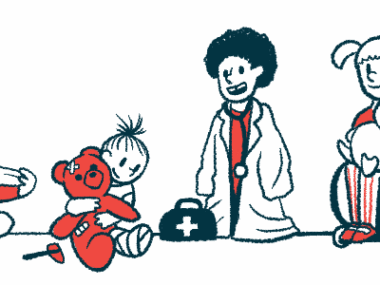Learning to cope with obsessive behavior in Prader-Willi syndrome
Perseveration has long been a challenge for my adult son, Robert
Written by |

I once wrote an essay called “The House of Questions.” In it, I shared questions my husband asks repeatedly, such as, “If you were me, which way would you drive home?”
This might be hard for a spouse who didn’t have my superpower. After all, I raised a son with Prader-Willi syndrome (PWS). Robert, 36, now lives in a group home for those with PWS, but for 19 years, I answered his repetitive questions and witnessed his obsessive behavior and perseveration, or inability to move on from a topic or situation. For Robert, this meant asking the same question multiple times and playing with the same toys or objects every day.
As a toddler, Robert was fascinated by strings of any kind, holding them up to look at and later dangling them. He was never interested in the toys most toddlers find stimulating. Eventually he moved on to jump ropes — never jumping, just watching the rope dangle.
For years, friends would gift our son toys that he never played with. His only other interest was Lite-Brite pegs, which can be plugged into a board to make designs. Robert repeatedly sorted the pegs by color, and if his grouping was interrupted, a meltdown would occur. He never placed them on the board.
As young parents, we weren’t aware of the importance of routine for people with PWS. Robert asked every day about what time we’d eat dinner and when certain events would take place. We now know that a strict routine alleviates stress for the person with the syndrome and their caregivers. Having dinner at the same time each day helped ease his anxiety and reduce the number of questions.
Early on, I would foolishly argue with Robert when he made statements that were incorrect. For instance, his firm belief that he was an angel drove me to distraction. But perseveration can cause people with PWS to become fixated on an idea or concept. Confronting them with an alternate view won’t change their mind.
As people with the syndrome age, certain symptoms may become more pronounced. Robert’s obsessive behavior made his teen years difficult. Game Boy and “Power Rangers” became his focus in life. Stories on TV seemed so real to him that they became a part of his reality and would accompany him to school.
It is fairly common now for children with neurological problems to be treated with medication. Unfortunately, the few medications we tried for our son were ineffective, seeming to only make his outbursts more intense. We didn’t pursue other psychiatric drugs, fearing they would also make things worse.
Resources and support are available
Happily, help is available for parents of children with PWS. The Prader-Willi Syndrome Association | USA offers resources and tips, including on how to cope with perseveration.
I’m also glad to see PWS groups on Facebook, where parents can inspire and connect with one another. You must be approved to join.
Cohort groups can also help you cope with the isolation of raising a child with PWS. Other parents often provide suggestions, but these may or may not help with your own child’s behavior. Every person with the syndrome is unique.
Recently, I was discussing TV programing with Robert, and he said, “LG TVs have more programs than other TVs.”
“I’m not sure that’s true,” I replied.
“Oh, I may be wrong,” Robert said.
Come again? It was a delightful moment of maturity on his part.
His current fascination is with the Nintendo Switch. He uses his monthly allowance to buy games that now number in the hundreds. He also works hard to gain food rewards through his exercise program. Whatever makes him happy makes us happy, too.
Note: Prader-Willi Syndrome News is strictly a news and information website about the disease. It does not provide medical advice, diagnosis, or treatment. This content is not intended to be a substitute for professional medical advice, diagnosis, or treatment. Always seek the advice of your physician or other qualified health provider with any questions you may have regarding a medical condition. Never disregard professional medical advice or delay in seeking it because of something you have read on this website. The opinions expressed in this column are not those of Prader-Willi Syndrome News or its parent company, Bionews, and are intended to spark discussion about issues pertaining to Prader-Willi syndrome.







Leave a comment
Fill in the required fields to post. Your email address will not be published.